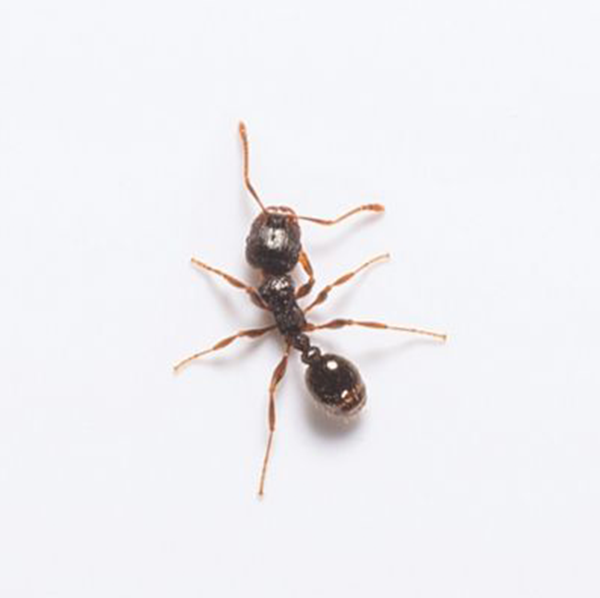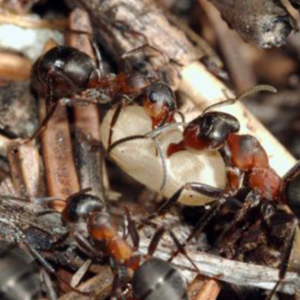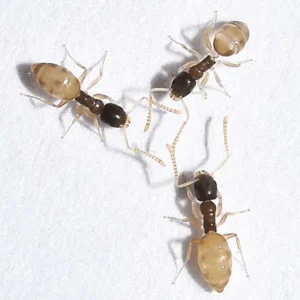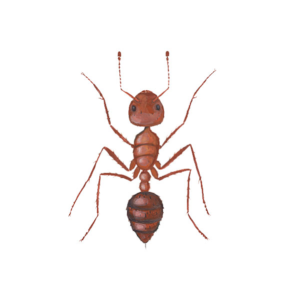Pavement Ant Identification
Pavement ants are a common ant species known for nesting in and around pavement cracks, sidewalks, and building foundations. They are small, dark-colored ants that often enter homes in search of food. In the North Carolina area, pavement ants feed on meat, grease, dead insects, seeds, and sweets. However, their favorite food is the honeydew produced by aphids and mealybugs. Swarms from mature pavement ant colonies occur in the spring but may occur continuously if the nest is located indoors. Ant swarmers are sometimes confused with termites and cause unsightly issues when swarming in commercial buildings. Since they build their nests in pavement, walkways, and sidewalks next to structures, they often make their way indoors in search of food.
What Do Pavement Ants Look Like?
Pavement ants, scientifically known as Tetramorium caespitum, are small ants typically measuring about 1/8 inch in length. They are dark brown to black in color and have parallel lines on the head and thorax. Their limbs are lighter than their bodies, and they have antennae with a 12-segmented club at the end.
Signs of a Pavement Ant Infestation
Pavement ants move in slow deliberate motion and trails are often seen at night going to and from food sources. True to their name, pavement ants nest under or near sidewalks, slabs, and concrete, making urban habitats ideal due to the lack of vegetation. When building nests, they place any soil removed in a mound near their nesting site. These mounds are usually discovered on the surface of the ground or next to a patio or sidewalk. Inside homes, ants tend to be found in kitchen areas or the patio, establishing nests inside wall voids, insulation, or under flooring.
Habitat, Diet, Life Cycle & Bites
Where Do Pavement Ants Live?
Pavement ants build their nests under pavement cracks, in the ground, under stones, and along curbs. Indoors, they nest in walls, insulation, and under floors, often entering buildings through cracks in the foundation.
Diet of Pavement Ants
Their diet is diverse and includes sweet substances, proteins, grease, and dead insects. They are known to forage in homes for crumbs, spills, and pet food.
Life Cycle of Pavement Ants
Pavement ants undergo complete metamorphosis, progressing from egg to larva, pupa, and adult stages. They have a complex social structure with worker ants caring for the young, and a colony can house multiple queens.
Pavement Ant Bites
Pavement ants can bite and sting, but they rarely bite humans.
Are Pavement Ants Dangerous?
Pavement ants are not considered dangerous or harmful to humans. Considered a nuisance pest, pavement ants create unattractive piles of debris on driveways, sidewalks, and inside commercial buildings. Pavement ants contaminate food as they invade homes in large numbers. When nests aren’t treated in time, pavement ants will continue to spread throughout a home or business as they form new colonies. If you suspect a pavement ant infestation, consult a professional ant exterminator.
How to Get Rid of Pavement Ants?
Effective control of pavement ants involves eliminating food sources, sealing cracks and crevices in the building’s exterior, and maintaining cleanliness, especially in kitchen areas. Baiting and chemical treatments can also be effective in controlling infestations.
Pavement Ant Prevention Tips
Prevent pavement ants by ensuring proper sanitation, storing food in airtight containers, repairing pavement cracks, and reducing moisture around the building’s foundation.
Need help with Pavement Ants control?
FAQs
Should I Kill Pavement Ants?
While killing individual ants may provide a temporary solution, it’s more effective to address the root cause of the infestation, such as eliminating food sources and nesting sites.
Are Pavement Ants Aggressive?
Pavement ants are not typically aggressive towards humans but may engage in aggressive behavior towards other ant species.





